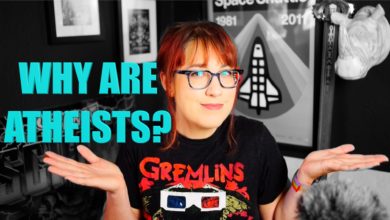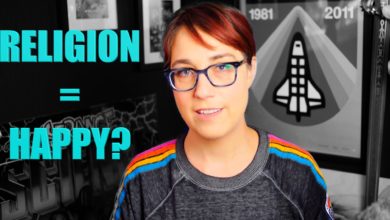Neil deGrasse Tyson is Wrong about Scientology and Cults

Support more videos like this at patreon.com/rebecca!
I know I just talked about an HBO documentary I loved, but there’s already another one that I have to mention: Going Clear, the documentary based on the book of the same name, premiered last week and it’s really a well-done piece of filmmaking.
Going Clear covers the seedier aspects of Scientology: things like their habit of taking as much money from the faithful as possible, of forcing people to disconnect from their non-Scientologist family and friends, their stalking and libeling of critics, and their abuse of unpaid or poorly paid workers.
While those broader facts may be well known at this point, it’s still important for people to watch the film and get additional insight into the truly horrific details of what has been going on inside the cult for the previous few decades, and possibly renew calls for people to stop buying tickets to see Tom Cruise and start petitioning the IRS to revoke the Scientologists’ tax-exempt status.
And because I think that, I am now going to disagree with Neil Degrasse Tyson for possibly the first time ever: when someone asked him about his feelings about Scientology, he pointed out that their beliefs were just as weird as Christianity’s, and the only difference between a cult and a religion is the length of time it’s been active.
I understand why he said those things, because I’ve said those things. Those things are, like, annoying atheist 101, a stage that I think most atheists go through at some point.
It’s true that Scientology’s belief that an alien imprisoned a bunch of souls in volcanoes and then blew them up with bombs is equally as silly and implausible as a god impregnating a virgin so that the baby can grow up and get murdered to forgive humanity for behaving the way that the god made them.
But it’s not true that Christianity and Scientology are equal on the cult scale. Maybe a part of it is time: it’s not just that we think more of older things, but that religions definitely do mellow after a few millennia. Right now, Scientologists aren’t even told what they believe until they’ve given many years and all their money to Scientology. Hiding your religion’s beliefs from your own adherents? Yeah, that’s a cult.
Cults like Scientology are also set apart by their insistence that members cut off all contact with their support network, forcing them to rely upon the cult for everything they need. I was raised Baptist and when I became an atheist, my former church didn’t insist that my family cut off all contact with me. Some religions, like the Amish, do. That is culty behavior.
And my old church also, as far as I know, never tapped my phone lines or tried to have me institutionalized. Had I been a Scientologist, that may have been different.
So yeah, I get that it’s cute to say that Scientology is just as crazy as any other religion, and that you’re hoping it forces religious people to realize that we’re all just people and their beliefs are just as stupid as everyone else’s and why can’t we all just get along, but it just doesn’t work. Comparing Scientology to mainstream Christianity doesn’t make Christianity look worse – it just whitewashes Scientology.
I highly recommend Tyson actually watch Going Clear, or read the book, to see exactly why Scientology is a danger to the people who join, as well as to the people who have friends or family who join, and especially to the people who have the temerity to criticize the cult.





Some branches of Christianity are more culty than others. For example, Mars Hill Church of Seattle. Much has been written about Mark Driscoll’s controlling behavior, including this article: http://www.thestranger.com/seattle/church-or-cult/Content?oid=12172001
Not all Christian churches are this culty, of course. But some are.
I agree, it’s not just the Amish that shun those who leave the faith, Mormons, Jehovah’s Witnesses, and even some sects of “the big three” do the same (or worse).
Just one of the many reasons we should strip all churches of their automatic tax-exemption and force them (individually) to prove they are actually doing good before we give it back. For many churches this won’t be much of a hardship, others would have quite the time just trying to figure out what “the good of the community” means.
I totally see what you’re saying, but I think Tyson’s talking about the actual ideas of the religions, which are comparably silly, while it seems that you’re talking about the behavior of its adherents and how they apply those ideas.
You make a good argument, but I have to disagree.
I was raised in a typical Baptist church. When I left a few years ago, they didn’t disown me. They didn’t tap my phones. I’m still FB friends with most of them.
But I don’t think we should be so quick to say that they are not a cult. I spent most of my life believing that nearly everyone was going to be tortured in the Lake of Fire for eternity. I spent most of my life believing that I was going to live forever in heavenly bliss. I listened to Contemporary Christian Music rather than the sinful mainstream music (mostly). To various degrees, I lived my life separated from normal society. I was taught junk science.
There was always an us-vs.-them—believers-vs.-unbelievers—aspect to everything in my life for 35 years.
In my opinion, manipulating a child through eloquent threats of hellfire is every bit as bad and cultish as anything Scientology is known to do.
What many people don’t know or understand (as some of this is even hidden from lower-level Scientologists or anyone who doesn’t have ‘clearance’ to know) is that the abusive nature of those in Scientology is sanctioned, encouraged in some cases demanded by the actual L Ron Hubbard policies themselves.
In Scientology, L Ron Hubbard’s word MUST be followed without alteration and with no exception. This means that those who practice Scientology outside of the official organization, cherry-pick to use those things within the doctrine that are not abusive and try to leave out those things that are not (and sometimes it’s difficult to tell because some seemingly benign applications turn out to be quite destructive over time).
When people decide to pick and choose what they will believe or apply and what to leave out, they are no longer technically following Scientology and might as well just call it something else.
There are no solely benign applications of Scientology and it’s not just the supposed aberrant behavior of a few bad apples who are misinterpreting L Ron Hubbard’s dictates. The abuse starts with Hubbard and cannot be stricken from the ‘religion’ because that would be unthinkable. It’s not allowed.
So, Tyson would need to do an in depth study to understand and should not speak in an authoritative way on the subject until he does so.
“ENEMY: SP Order. Fair game. May be deprived of property or injured by any means by any Scientologist without any discipline of the Scientologist. May be tricked, sued or lied to or destroyed.
— HCO Policy Letter of 18 October 1967, Issue IV, L. RON HUBBARD”
“Never defend. Always attack” — L. Ron Hubbard
http://www.xenu.net/archive/go/philosop.htm#fairgame
Hubbard was a mentally-ill man. He was very paranoid and his policies show that he saw enemies around every corner and wrote policy after policy on how to do away with them.
Another important element is how Scientology is about psychiatry. Some people absolutely need help, including medication. Scientology forbids psychiatric medication for reasons I won’t get into here. You know the reasons, I know the reasons, but we can’t mention the reasons without getting their lawyers all over us for copyright infringement. (Yes, Scientology is popular in Hollywood. Why do you ask?)
I’ll be happy to point out that it was because Elron was told he needed help and didn’t like the news so he hated the messenger.
Fairly simple actually. They can label me OP all they want, and you can’t get blood from a stone. In fact, the internet and the free exchange of ideas is the Church of Happiness’ worst nightmare.
I was going to make the same point, but you beat me to it. They actually lobby against the use of psychiatric meds even for non-Scientologists. So, they don’t just harm their members and former members. You could almost say that their hatred of psychiatric medications is psychotic. ;-)
Looking at this sociologically, what Rebecca is saying is right. Cults have a fairly specific definition. Isolation from family is a big part of it. It doesn’t take much to Google the difference between religion and cult and understand why they are different. On of the most definitive ways is through a charismatic leader and through specific brainwashing which Scientology does overtly.
Generally speaking the overlap comes along when you are under control of the group and are isolated. SO in Trav’s example its is probably hitting cult status. But for most Christian church goers they are free to be a member of the congregation without reporting their every move to the church.
The charismatic leader usually is a sign as well. Although L Ron Hubbard is dead, most people in Scientology are non-questioning of David Miscavaige and if you are caught questioning him you are threatened. Even in most cases (I am sure there are exceptions) a regular Roman Catholic (IE not a nun, priest etc.) doesn’t become shamed and excommunicated if they question the pope.
Heresy is still grounds for excommunication. Doubting the pope isn’t heresy, but contesting his divine authority is.
And while excommunication is extremely rare these days, and all excommunication falls under the umbrella of toleratus(which allows Catholics to have dealings with you), the reforms that made that the case were just 3 decades ago.
That’s pretty recent.
I read the Tyson quotes and I’m trying to figure out what he said that was wrong, and I really don’t get how people are saying he is defending Scientology. He said they all were equally wacky, not sure how that is a defense.
Scientology needs to be investigated for all it’s alleged crimes, as does the Catholic Church, as does Mormonism, as does every large organisation that has been accused of the kinds of serious crimes that have been put forward, saying that all religions are wacky doesn’t excuse that in any way.
It may also be beneficial to draw a distinction between the Church of Scientology and the Free Zone movements, the latter of which are basically “all the weird stuff CoS believes, but without the behavior that causes them to have more lawyers kept on retainer than Lexcorp”.
I think we’re all missing the point. So maybe Scientology is a cult and not quite a religion, it’s really just a semantic issue in how we define things. However, the real issue Neil is trying to point out, is that it doesn’t really matter if they are different, they both cause immense harm to their members, skew the truth, and often harm outsiders who don’t share their belief system. Now one may be different than the other in how they go about those atrocities, but hey, tomato tomato…they’re all crimes against humanity in the name of divinity.
This exactly. Harm should be called out because it’s harm, not because one of the groups causing harm is also culty.
Scientology arguably causes much more harm than your average (modern) church. People are used as slave labor — one of the punishments for wrongdoing is forced labor. People are pressured into taking expensive classes that drive them into debt and then given “jobs” by the church that pay so little they’ll never work off the debt. Parents are held hostage by being separated from their children and only allowed limited access to them. People disappear and no one knows what happens to them. David Miscavige’s wife has not been seen in public for 8 years. Two missing persons reports have been filed for her, only to come to nothing.
I understand that Tyson was probably only comparing the beliefs, but the words come across as dismissing a group that is extremely harmful as something harmless and silly and I think it’s important to clarify that there’s much more to Scientology than their weird beliefs.
Well as far as crazy beliefs go ya I think Christianity and Scientology are in a very similar boat. Believing in any delusion is dangerous, especially when it encompasses your life’s beliefs and how your going to interact with society. Why not check out the Vatican City. There are also many different varieties of Christianity so you have to be careful of lumping them as one religion. Also, Christianity is far more popular and influential, in Western Civilization than Scientology which gives people this idea that there beliefs are not as crazy as others because they live in the comfort of their own delusional bubble.
You make some excellent points, Rebecca! I’ve made similar comments myself about the major religions being just as crazy and so has my boyfriend (who was raised a Christian). I was raised an agnostic, but I’m of Jewish extraction. I’m not sure if being raised without religion alters my perspective on this, or not. I also thought growing up reading science fiction (though no L. Ron Hubbard) might have influenced my reaction to Scientology, which sounds like just the kind of religion a hack science fiction author might dream up. Aliens…natch. An intergalactic battle–check. And, of course, psychic phenomena. It actually sounds like satire to me. But then, what the Church of Scientology does is far from funny.
I think Tyson’s quote refers to their beliefs, not their institutional behavior. He’s saying that from the standpoint of evaluating their creation myths (which is what probably strikes most of us about Scientology besides the outrageous institutional behavior) they are both so implausible that evaluating the difference between them is counterproductive. They’re both sets of irrational beliefs based on faith rather than evidence that motivate potentially antisocial behavior. Scientology, when compared to, say, Catholicism, has simply had to pack in a lot more of its antisocial behavior into a short history, whereas Catholicism can spread its nastiness over a couple thousand years, give or take.
It would really be more appropriate to compare Scientology to the mafia crime syndicate than to any other religion. Possibly Mr. Tyson doesn’t know that Scientology is not recognized as a religion in many countries.
Also, did he see Going Clear? Has he read the plethora of critical or investigative books on the subject? Does he know the history or not only its founder and current leader but of the organization itself?
Has he read the FBI files? Does he know that this “religion” broke into the United States Federal Government where upon many leaders of the organization we imprisoned including the founder’s wife?
Does he know of the history of abuse both past and present? I submit that he needs to do a lot more studying before he makes blanket statements like this to the world.
I find it his statements off for someone considered such a great critical thinker.
You didn’t read the Beast article did you?
He specifically said he hadn’t seen the documentary so the question was shifted to his opinion of Scientology in general.
He wasn’t defending Scientology, the headline writers got it wrong, he was saying that their wackiness was no more wacky than other religions. He did ask what makes a religion a religion and a cult a cult (his answer seemed to be time) but I highly doubt that he was using the terms in the sociological context but rather in a more general way. Perhaps that is poor communication on Dr. Tyson’s part but I think we are setting an impossibly high bar for something he was asked his opinion on.
He was not asked about their behavior, he was talking about their beliefs and how we should be allowed our beliefs, no matter how wacky, unless they start hurting others if we want to be a free country.
If I were to take issue with anything he said it would be that he objects to Indiana’s new “religious freedom law” on economic grounds when there are so many more salient reasons to object to it.
What I found supremely annoying was that he stated that he has not read the book or seen the movie. Had he done so, then he would know that Wright went out of his way to distinguish between “cult” and “new religious” movements. In many ways the documentary, but specifically the book, are about how religions are made. Wright points out that Scientology is at a point in its development where it could either loose the abuses and become a mainstream religion or continue on its current trajectory. Wright also makes the same point that Tyson made in regards to beliefs of other religions being just as ridiculous but also being mainstream. I wish Tyson had simply said, “I haven’t read the book or seen the movie,” and then done the research.
Did you read the original Beast article? Because he specifically said he hadn’t seen the documentary at which point the question shifted to NdGT’s take on Scientology since it contains aliens.
At that point Tyson started talking about beliefs not behaviors and was not addressing the book or the documentary. I suppose he could have said that he didn’t want to talk about it, but he was asked his opinion, specifically his opinion, about Scientology in general.
He said that their beliefs were no stranger then established religions and he did not address their behavior. And once again headline writers misconstrued the message, NdGT did not defend Scientology. He said that all religions were a big ball of goofy, and while that might seem to elevate Scientology to the level of other religions that is not the fault of what Dr. Tyson said.
The problem is that we (as a society) give too much reverence to religion in general, if a crime is committed they should be subject to the laws of society and that would go for Scientology as well as the Catholic Church, the LDS, or something small like Westboro. If we wouldn’t accept that same behavior from a company or an individual we shouldn’t accept it from a church.
That should also apply to the rich, the connected, the privileged, etc. that jurisprudence doesn’t seem to reach, so maybe we should just add it too the big pile of things that need to be fixed. And as much as I like Dr. Tyson I’m not sure he’s up to the challenge of changing every one of them by himself.
I find it problematic to focus on the CoS’s cult/young status when discussing its abusive tactics, rather than framing it as yet another religion/ideology that has shitty practices.
I also think the CoS is fucking awful and irritating, but I also think the Catholic and Mormon groups that have fought against gay rights are awful and causing real harm to both their members and society in general.
I think there’s something to be said about people being interested in this type of “investigative reporting” on CoS because it’s new and culty, unlike the Catholic or Mormon church’s practices.
I’m going to get the book as well (now), I didn’t know about it previous to this movie.
I actually agree with what Tyson is saying in that there are likely some communities within Scientology which are mellower than others. And there are definitely specific churches within various sects of Christianity, Judaism, etc that encourage eliminating contact with non-adherents, have community members spy on each other, etc ad nauseum.
I think his response, as well as mine, come from a place of feeling like this specific, targeted look at Scientology for a lot of people is coming from a place of “Lol look at these weirdos with their weird beliefs” rather than a purely concerned place for those who have been abused, since there are plenty of examples of abusive behavior in other religious communities.
So while I agree that the issues with Scientology must be discussed because it is important to root out and expose abusive behavior wherever it occurs, I agree that Scientology isn’t at all alone in its culty status, and that investigating abuse shouldn’t hinge on an ideology’s cultiness but rather its abusiveness.
I really enjoyed this video, but I take issue with this:
“And my old church also, as far as I know, never tapped my phone lines or tried to have me institutionalized. Had I been a Scientologist, that may have been different.”
There are plenty of christian sects that engage in similar behavior. These aren’t outlier groups, either. You mentioned you were baptist. While your experience was ‘okay,’ plenty of peoples’ experiences were not. Baptists are more than willing to promote things like gay conversion therapy and shunning, which is de facto rule for many churches. I’ve been volunteering at a LGBTQ non profit, and it’s pretty astounding how many of those kids have been kicked out of the religious vs. nonreligious households. Again, the whole “Well my church was okay” just doesn’t work for the argument. Then there’s the money thing. People throw money at religion regardless of whether or not they want teh secretz. Scientology is probably the most blatant, despicable example, but just look at how many mega churches exist in the US. Look how many money drives are going on for mission trips. When I look at all these religions, I see the same thing. Some are just dressed up a little more.
There are certainly differences between something like christianity and scientology, but I can’t help but see
this post offered me a fresh perspective on an old problem, something that so seldom occurs that i felt genuine pleasant surprise. particularly the last line, which basically sums up the problem with these comparisons: you don’t get through to the major religions; you just end up legitimizing a cult in the eyes of many religious folks. it seems to me a bit like the reason that Dawkins and most evolutionary scientists give for refusing to debate creationists: it gives the appearance that their positions are even worth considering. but, all the same, i believe the age of a cult/religion/religious cult does factor in, albeit sometimes indirectly. for example, “christianity” is a rather broad term to say the least when you’re trying to identify a cult. one may try to be more specific, as was the author concerning being raised baptist, such as pointing to the catholic church, as i freely do, and labeling it a cult. that’s owed largely to my psychologically-terrifying catholic upbringing, which itself is largely owed to a pervasive toxic atmosphere *at the particular churches/schools i was forced to attend.* so in point of fact, singling out catholicism ceases to be adequate. what has happened is that christianity became huge after its undeniably cultish beginnings, then some more rational, less insane offshoots emerged, and now there’s a “cult spectrum” within christianity and catholicism itself. i think the unifying factor here is “faith” – the notion that belief of the deepest order in the face of utterly damning evidence counter to that belief – is not only normal, but is somehow a virtue, and makes one a better person. it is the redefining of the very notion of “truth” that allows cults to be effective, and the same is true for religions.